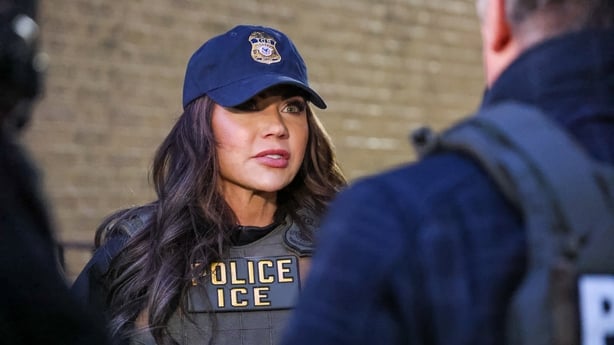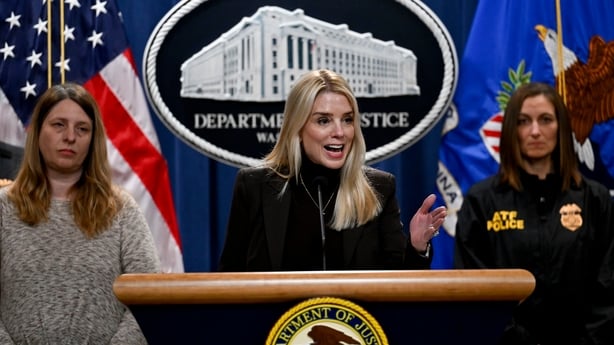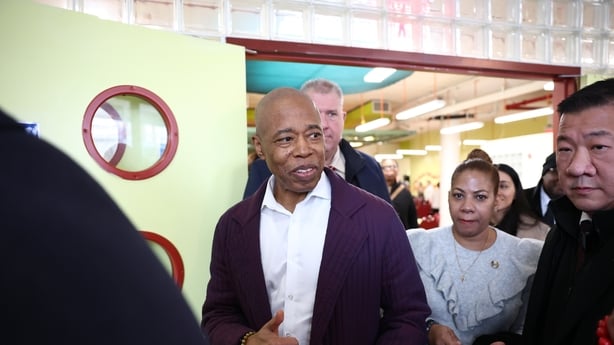Betty - not her real name - is an asylum seeker from Peru who has been in the United States for the past two years, waiting for her case to be processed through the courts.
Since Donald Trump came to office last month, on a promise to deport millions of illegal immigrants, Betty has barely left her house outside New York.
"I go to work, and I go home," she told RTÉ News.
She stopped going to church, the laundromat and even the supermarket, out of fear that she would encounter agents from US Immigration and Customs Enforcement, known as ICE.
She even avoided going to the doctor when she fell ill, she said.
"I don't feel safe here anymore," she added.
New York was one of the first places targeted within days of Mr Trump entering the White House.
Homeland Security Secretary Kristi Noem, accompanied by television crews from US news networks, donned a bulletproof police vest to join the highly publicised pre-dawn raids.
"I’m in the city to get the dirtbags of our streets," Ms Noem said in a video message.
But federal officials were not happy with the level of cooperation from local authorities.
The Department of Justice sued the State of New York and senior officials, alleging they were resisting President Trump’s hardline immigration policies.
In her first press conference on Wednesday, new Attorney General Pam Bondi said New York had prioritised "illegal aliens over American citizens".

In response, New York State Governor Kathy Hochul said in a statement: "We expect Pam Bondi's worthless, publicity-driven lawsuit to be a total failure".
"Let me be clear," she added, "New York is not backing down."
It is the latest spat in an intensifying legal battle pitting the Trump administration against Democrat-run states and advocacy groups over immigration.
The new anti-immigration sweep remained popular with President Trump's supporters as officials circulated footage of shackled immigrants on military deportation flights.
But opponents said the new policies - such as rescinding protection of "sensitive locations" such as schools, hospitals and places of worship from raids - plunged immigrant communities into fear and paralysis.
Demonstrations against the crackdown took place in Times Square in New York City last weekend.
Since President Trump’s inauguration school attendance records showed a drop-off of between 5 and 20%, according to Naveed Hasan from the Panel for Educational Policy, New York Board of Education, as parents kept their children home.
"They were essentially terrorised," Mr Hasan told RTÉ News.
"If you tell a parent you may never see your kid again or be separated for a very extended period of time, they will probably do anything to prevent that from happening," he said, "and the first thing they did was hide."
Around 50,000 children were new arrivals to New York’s public school system in the past two years, he said, many of them immigrants.
Schools scrambled to issue directives to teachers and administration staff on what to do if ICE agents attempt to gain access to a school building.
"The school safety officer is directed to ask for a warrant signed by a judge," Mr Hasan said.
If a warrant is presented, the school must confer with Department of Education lawyers on how to proceed.
"Absent any of that, they are not allowed access to the school," he said, adding "we are standing firm on our on our promise to protect kids and families and make sure that they're getting educated, as all children deserve."
There have not been any reported incidents of immigration officials attempting to access New York schools, Mr Hasan said, but he had received unverified reports of students being approached near school buildings.
That prompted him to propose training programmes for students to the Board of Education.

"We really didn't imagine that we would also have to teach the kids how to talk to federal law enforcement," he said, adding that students would be taught "don't say anything, but don't be scared, and [that] you have constitutional protections as children as well."
Local officials and immigration lawyers organised "know your rights" information sessions.
"Most people understand that you do have the right to remain silent and that if an immigration officer goes into a private place, like a person's home, they do need a warrant," said Veronica Cardenas, an immigration attorney.
But ICE agents can approach people in a public space and ask if they were born in the United States, she said.
"Once a person starts speaking and they tell them that they were born abroad," she said, "that automatically gives immigration enough probable cause to arrest them".
They would then need to show a permanent legal resident card or a US passport, she added.
ICE agents carry weapons, she said, adding that it can be "very intimidating".
New York’s "sanctuary city" status means that local law enforcement is not obliged to fully cooperate with federal immigration officials to, for example, honour requests to detain undocumented migrants for transfer to ICE custody, except in the case of "violent or serious crimes".
Proponents of the laws say they afford non-citizens due process and encourage New York residents without status to cooperate with law enforcement without fear of deportation.
But America’s sanctuary cities are now firmly in the sights of the Trump administration and Republican lawmakers on Capitol Hill.
President Trump’s newly appointed "border csar" Tom Homan called sanctuary cities "sanctuaries for criminals".
He previously said he would double the number of ICE agents if New York City authorities failed to cooperate.
Mr Homan warned that non-criminals could get swept up.
"There’s going to be more collateral arrests in sanctuary cities because they forced us to go into the community and find the guy we’re looking for," he said.
"Sanctuary mayors have prioritised criminal illegal aliens over the American people," James Comer chair of the House of Representative Oversight Committee wrote on social media.
He called the mayors of Chicago, Denver, Boston and New York to give testimony to Congress next month.
"They owe Americans an explanation for their policies that jeopardise public safety and violate federal immigration law by releasing dangerous criminal illegal aliens back onto the streets," he wrote.
New York City mayo Eric Adams, a Democrat, cultivated a warm relationship with the Trump administration.
Mr Adams visited Mr Trump at his Mar-a-Lago resort in Florida, attended his inauguration and expressed support for the president’s immigration crackdown.
In 2023 when more than 100,000 asylum seekers arrived in New York from the southern border, Mayor Adams said the issue "would destroy New York City," drawing condemnation from fellow Democrat lawmakers.
Last week, the US Department of Justice dropped a corruption case against Mr Adams, arguing that it hampered the mayor’s ability to help enforce the administration’s immigration policies.

Asked whether the ruling "compromised" the city mayor, Governor of New York State Kathy Hochul said: "That is speculation...I don’t know...I don't know whether anyone is compromised in that situation," adding she believed Mr Adams would put the interests of New York City first.
But advocacy groups fear that New York’s sanctuary status as well as the protections for hospitals, schools and churches will remain under pressure from Washington.
Court challenges to the administration’s directives around the country are being closely watched.
Last week, a group of Quaker congregations filed a suit against the US Department of Homeland Security in the State of Maryland over the rescinding of protections for schools, hospitals and places of worship.
It was quickly followed by another case lodged in Washington, DC, by 27 Jewish and Christian faith-based groups, which cited the arrest by ICE agents of an asylum-seeker from Honduras during a Sunday church service he was attending with his wife and children in Atlanta, Georgia.
New England Quakers General Secretary Noah Merrill said the government’s new guidance was "an unnecessary and extreme infringement on our religious liberty".
It was unnecessary, he said because law enforcement already retained the right to present evidence and get a warrant from a judge to pursue criminals into churches.
The impact of this new policy, he said, was "widespread fear" not just for undocumented but other immigrant communities too.
It undermined "people's sense of trust that religious congregations can be a place of safety," he told RTÉ News.
Mr Merrill cited the example of a church outside of Boston where the congregation was "rooted in the Haitian community," and where "two thirds of the worshippers did not show up," for the Sunday service following the policy change.
"From our beginnings in the 1650s in England," Mr Merrill said, "Quakers have always known the importance of religious freedom".
The legal battles could drag on for months.
In the meantime, immigrants are keeping their heads down.
"If anyone stops me, I’ll try not to talk," said Betty.
"I’ll carry on my asylum application," she added, "but I don't look at this country in the same way anymore".







